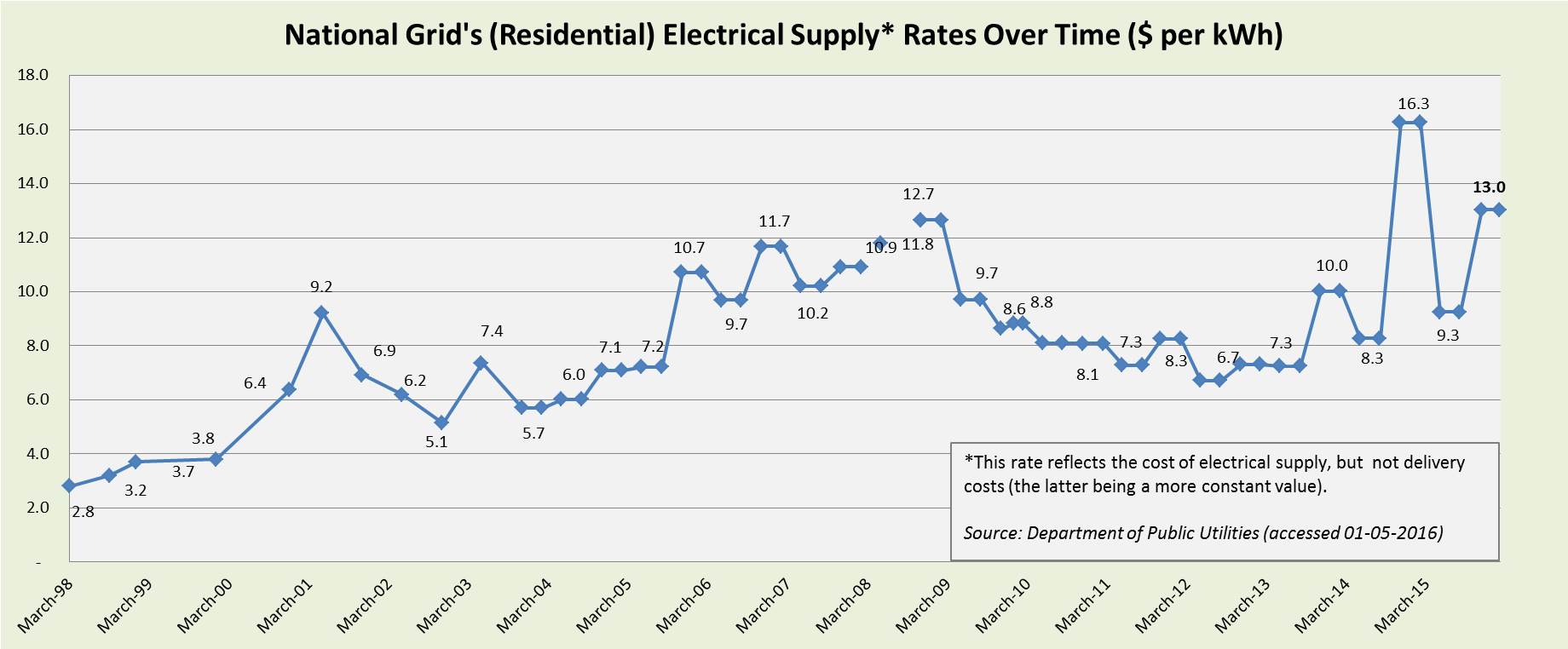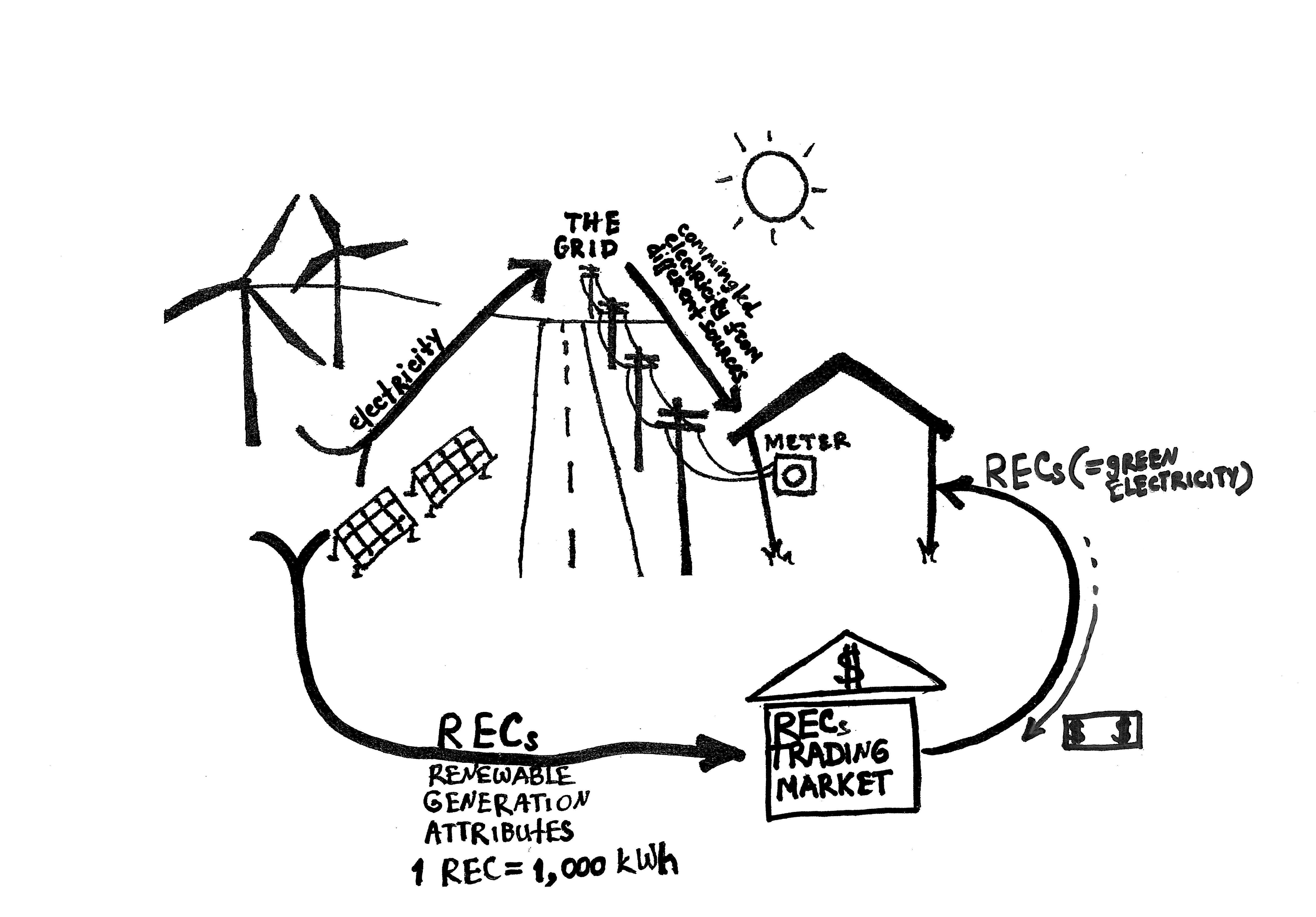Green Electricity - How Much Does It Really Cost?
Is renewable energy important to you? Do you think you can afford an additional $12 per month?
Here is an example:
- Your home uses 600 kWh a month, on average.
- Your regular electrical supply cost is 11 cents per kWh.
- Electricity delivery costs are an additional 10 cents per kWh.
- Your electricity provider offers 100% renewable energy for additional 2 cents per kWh.
- This increases the cost of your total monthly electrical bill by $12 (up from $126 to $138), similar to a cost of a matinee movie ticket or a pizza...
Interested to learn more? See below for more information.
|
Survey results have consistently shown that customers express a preference and willingness to pay more, if necessary, for cleaner energy sources. Buying green power is one of the simplest and most effective ways consumers can choose to reduce their carbon footprint. Also, choosing state- or regionally-sourced renewable energy helps to grow the renewable energy economy closer to home and contributes toward energy independence from the volatility of fossil fuel energy markets. |
Your electrical bill consists primarily of two parts: delivery and supply. Supply costs typically vary much more over time than delivery costs. Massachusetts electrical supply costs have been steadily rising over time:
In Worcester, residents pay National Grid for delivery services which involve the maintenance of the electric grid and delivering power from a point of generation to you (distribution, transition, transmission, etc.).
As a result of Massachusetts Electric Industry Restructuring Act of 1997, electrical utility companies are responsible for delivery services but are no longer responsible for electricity generation. Therefore, your electrical supply is either provided to you by National Grid (which secures electric power supply on your behalf) or by a competitive supplier of your choosing.
|
|
National Grid changes its fixed electrical supply rates every six months. Here is a list of its residential fixed supply rates (basic service): |
||
|
|
|||
|
|
|
November 1-April 30 |
May 1-Oct 31 |
|
|
2016-2017 |
9.787 cents/kwh |
TBD |
|
|
2015-2016 |
13.038 cents/kwh |
8.042 cents/kwh through Sep 30 & 8.084 cents/kwh for the month of October |
|
|
2014-2015 |
16.273 cents/kwh |
9.257 cents/kwh |
|
|
2013-2014 |
10.025 cents/kwh |
8.277 cents/kwh |
|
|
2012-2013 |
7.314 cents/kwh |
7.251 cents/kwh |
As an electricity consumer, you have the ability to choose the way the electricity you use is produced and shop around for best plans for you.
Under the current state regulations (which led to establishment of a Renewable Portfolio Standard program), in 2015, 12% of your electricity already came from renewable sources of energy (with 7% more coming from waste and alternative renewable energy)! You can further increase the portion of renewable electricity provided to your home because competitive electricity supply option allows Massachusetts customers to shop around for providers looking for the energy service plan that best fits their own needs and values - whether their priorities are fixed cost, best price, type of electricity, or its source.
Due to design of the electrical grid, short of connecting your house directly to a renewable energy generating system (e.g. a solar panel or a wind turbine), the only way to ensure that your home gets renewable electricity is through purchase of Renewable Energy Certificates. Click here to learn more. The two main options available to you for greening your electricity are:
|
If your electricity is supplied through National Grid (default "basic service rate"), you can enroll in GreenUp! GreenUp allows you to continue getting your electrical supply from National Grid, while selecting a renewable energy company to purchase enough Renewable Energy Certificates to match your monthly electrical consumption, therefore making your electricity ‘green’. On-billing: Your billing method will not change - you will still have to pay one bill for electricity, but will start seeing the name of the renewable energy company on your monthly bills. Click here for more information from National Grid or here for GreenUp FAQ. |
|
If your electricity is supplied by a Competitive Electricity Supplier approved by the Department of Public Utilities (DPU), check to see if it offers renewable energy. As of January, 2016, 11 of 25 suppliers offered renewable energy! This option allows you to get your electricity as well as Renewable Energy Certificates through the same company. DPU licenses competitive suppliers doing business in Massachusetts and maintains a list of current offers, which is a great place to start the overview and comparison of the options and rates available to you (for conventional and renewable electricity). Go to "Let’s Go Shopping – For Electric Supply" and choose National Grid as your electric distribution company. You will then be able to download an Excel spreadsheet that is updated frequently and which provides important information for each licensed electrical supplier, including whether or not renewable energy is offered. Currently, the spreadsheet only includes the electrical rates for conventional electricity, so you would need to check out individual websites for renewable energy rates. On-billing: All Competitive Electricity Suppliers approved by the DPU are allowed to use on-billing. The supplier of your choosing will ask for your National Grid account number. After the initial set-up, the bills you will receive from National Grid will include both the charges for delivery from National Grid and for (renewable electricity) supply from the new supplier. |
Depending on your current plan and other offerings, sometimes, the cost of electricity derived from renewable sources can be smaller or comparable to that coming from conventional (i.e. fossil-fuel) sources.
For example, a random sample of two suppliers on the DPU list offer the following, as of January 2016:
| Supplier 1 | Supplier 2 |
| 11.99 cents/kWh, fixed, for 12 months, conventional source of electricity | 9.19 cents/kWh, fixed, for 12 months, conventional source of electricity |
| 12.99 cents/kWh, fixed, for 12 months, green source of electricity | 10.74 cents/kWh, fixed, for 12 months, green source of electricity |
|
***By comparison, if your electricity is supplied by National Grid, your rate is 13.038 cents/kWh through April 30, 2016. |
|
When shopping around for electrical supply rates, consider the following:
- Electricity price offered per kWh (an average residential electricity consumption in MA is 600 kWh per month - check what yours is on your bill!)
- Whether the rate is fixed or variable
- If renewable electricity is important to you:
- Percentage of electricity generated by renewable sources
- Source ("product mix") - percentage of different types of renewable electricity (solar, wind, hydro, etc.)
- Location where renewable energy is generated (local, regional, national).
- Term Length (most common ones are 6-month and 12-month terms)
- Early Termination Fee, if any, and more.
For Consideration: There are a number of factors that explain the wide range of prices for the Renewable Energy Certificates, but one of the main one is the type of the RECs trading market - voluntary or mandatory, read more here. There is also an argument that buying RECs in a mandatory (aka compliance) market (for higher prices) drives development of new renewable energy installations, as opposed to supporting the ones already built and operating in the voluntary market.
Purchasing green energy means either buying electricity directly from renewable electric generation sources or, much more commonly, purchasing Renewable Energy Certificates. That's how different competitive electricity suppliers can have a wide range of renewable product mixes (generation source and location). Click here if you want to learn more about how RECs work.
Did You Know?
- Department of Public Utilities (DPU) has a lot of important responsibilities that affect your utility costs and service. For example, DPU oversees investor-owned electric power and natural gas and ensures that these companies comply with the Commonwealth’s energy efficiency statutes and meet certain energy efficiency goals provided in those statutes.
- The City of Worcester is purchasing about a quarter of its municipal electricity from renewable sources (via Renewable Energy Certificates)! Click here to learn more.



